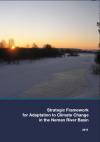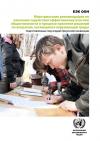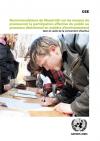Publications
Displaying Results 161 - 180 of 635
- English
The purpose of this report is to provide an overview of implementation of the river basin planning principle in the countries of Eastern Europe, the Caucasus and Central Asia. It is a follow-up to a benchmarking study by UNECE and OECD from early 2014, where the overall status with regard to implementation of the IWRM principles was described. With just two years passed since the previous
- English
- English
The Strategic Framework for Adaptation to Climate Change in the Neman River Basin has been developed under the international project “River Basin Management and Climate Change Adaptation in the Neman River Basin” . The Project was implemented between 2012 and 2014 under the Program of the United Nations Economic Commission for Europe (UNECE) and with support from the international Environment and
- Pусский
The Strategic Framework for Adaptation to Climate Change in the Neman River Basin has been developed under the international project “River Basin Management and Climate Change Adaptation in the Neman River Basin” . The Project was implemented between 2012 and 2014 under the Program of the United Nations Economic Commission for Europe (UNECE) and with support from the international Environment and
- Pусский
Available in English, French and Russian. If you would require a hard copy of the Guide please contact the secretariat at [email protected]
- Français
Available in English, French and Russian. If you would require a hard copy of the Guide please contact the secretariat at [email protected]
- English
Available in English, French and Russian. If you would require a hard copy of the Guide please contact the secretariat at [email protected]
ENG
FRE
RUS
- Français
Coordination between the water, energy, food and environment sectors is fraught with difficulties even at the national level, but the complexity increases substantially in transboundary basins where the impacts spread from one country to another. The “nexus approach” to managing interlinked resources has emerged as a way to enhance water, energy and food security by increasing efficiency,
- English
Coordination between the water, energy, food and environment sectors is fraught with difficulties even at the national level, but the complexity increases substantially in transboundary basins where the impacts spread from one country to another. The “nexus approach” to managing interlinked resources has emerged as a way to enhance water, energy and food security by
- Pусский
Coordination between the water, energy, food and environment sectors is fraught with difficulties even at the national level, but the complexity increases substantially in transboundary basins where the impacts spread from one country to another. The “nexus approach” to managing interlinked resources has emerged as a way to enhance water, energy and food security by increasing efficiency,
- English
This report was prepared as part of the National Dialogue on Water Policy and Integrated Water Resources Management in Kyrgyzstan with support from the UNECE. The basis for preparation of report was the request of the Government of the Kyrgyz Republic to implement a set of measures aimed at improving irrigation technologies and introduction of effective methods of crop irrigation, including
- English
The National Policy Dialogues is the main operational instrument of the EU Water Initiative (EUWI), an international partnership that aims to contribute to the achievement of the water related Millennium Development Goals. UNECE is the strategic partner supporting the policy dialogue process on IWRM. The OECD is the strategic partner for water supply and sanitation.
Updated Handbook for the 1979 Convention on Long-range Transboundary Air Pollution and its Protocols
- English
This updated handbook contains the Convention text and the most-up-to-date versions of all eight protocols to the Convention in their most recent amended version.
The Convention on Long-range Transboundary Air Pollution was the first international legally binding instrument to deal with problems of air pollution on a broad regional basis. It was signed in 1979 and entered into force in 1983. It
- Pусский
Transboundary water cooperation is necessary to manage shared waters in an integrated and sustainable way. It has the potential to generate many significant benefits for cooperating countries, such as accelerated economic growth, improved human well-being, enhanced environmental sustainability and increased political stability. Nevertheless, many challenges can prevent or delay countries from
- Français
Transboundary water cooperation is necessary to manage shared waters in an integrated and sustainable way. It has the potential to generate many significant benefits for cooperating countries, such as accelerated economic growth, improved human well-being, enhanced environmental sustainability and increased political stability. Nevertheless, many challenges can prevent or delay countries from
- Español
La cooperación en materia de aguas transfronterizas es necesaria para gestionar las aguas compartidas de manera integrada y sostenible. Tiene el potencial de generar numerosos beneficios importantes para los países que cooperan, tales como la aceleración del crecimiento económico, la mejora del bienestar humano, la mejora de la sostenibilidad ambiental y el aumento de la estabilidad política.
- English
Transboundary water cooperation is necessary to manage shared waters in an integrated and sustainable way. It has the potential to generate many significant benefits for cooperating countries, such as accelerated economic growth, improved human well-being, enhanced environmental sustainability and increased political stability. Nevertheless, many challenges can prevent or delay countries from
- English
Residential heating with wood and coal is an important source of ambient (outdoor) air pollution; it can also cause substantial indoor air pollution through either direct exposure or infiltration from outside. Evidence links emissions from wood and coal heating to serious health effects such as respiratory and cardiovascular mortality and morbidity. Wood and coal burning also emit carcinogenic
- English
The revised guidelines, as adopted by the Executive Body at its thirty-second session in December 2013 for application in 2015 and subsequent years, serve to assist Parties, through a common approach, in meeting their obligations under the Convention on Long-range Transboundary Air Pollution and its protocols. They support the evaluation of emission reduction strategies and facilitate the









